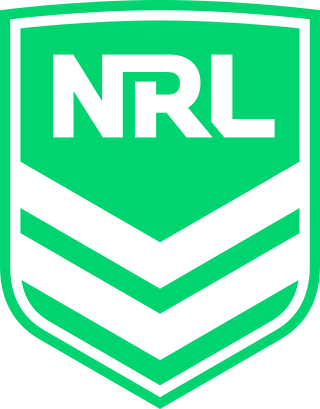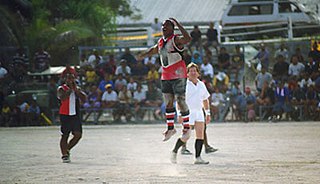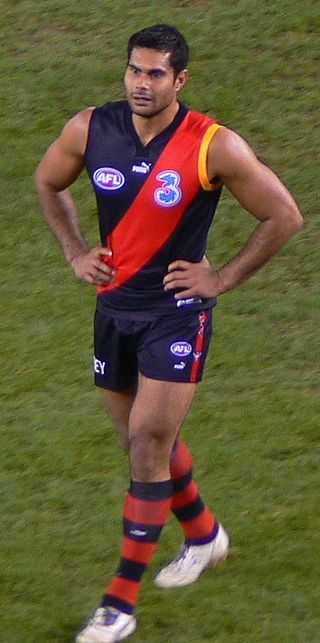
The National Rugby League is a professional rugby league competition in Australasia which contains clubs from New South Wales, Queensland, Victoria, the Australian Capital Territory and New Zealand.
The Australian Football International Cup was an triennial international tournament in Australian rules football. It was the biggest international tournament in the sport that is open to all nations. More than 26 nations have participated and the competition has expanded into multiple pools and both men and women's divisions. At the time of the last tournament in 2017, the sport had a record 170,744 registered players outside Australia growing at a rate of 25 per cent per annum.

Australian rules football is played in more than 60 countries around the world with approximately 1.4 million players worldwide. By 2017 more than 26 nations had contested the Australian Football International Cup, the highest level of worldwide competition. The AFL Commission is the world governing body which manages international competition through its International Development Committee headed by Andrew Dillon. There are 3 regional governing bodies affiliated to the AFL: AFL Asia, AFL South Pacific and AFL Europe.

The Irish national Australian rules football team represent Ireland in Australian rules football and is selected from the best Irish born and raised players primarily from the clubs of the Australian Rules Football League of Ireland but also playing abroad.

The United States national Australian rules football team, nicknamed the Revolution, represents the United States of America in the sport of Australian rules football. The Revolution are named after the American Revolution and wear the colors of the American flag.

Malcolm Robert Michael is a Papua New Guinean-born former Australian rules footballer. He is notable for his successful professional career in the Australian Football League. In a career spanning 238 games and three clubs in two Australian states he is best known as a triple premiership full-back with the Brisbane Lions. Michael is recognised as being one of the best Queensland produced Australian rules footballers of all time, being named on the AFL Queensland Team of the 20th Century.

The New Zealand national Australian rules football team (Māori: tīmi whutupaoro Ahitereiria o Aotearoa; nicknamed the Falcons ; previously the Hawks, is the national men's team for the sport of Australian rules football in New Zealand. The International Cup team is selected from strict criteria from the best New Zealand born and developed players, primarily from the clubs of the AFL New Zealand. Test and touring squads are selected using similar criteria to other international football codes, additionally allowing players with a New Zealand born parent to play.

The Nauru national Australian rules football team represents Nauru in Australian rules football. Despite its small size and population, Nauru, which is the only country with Australian football as its national sport, consistently ranks among the top eight teams in the world.

The Papua New Guinea national Australian rules football team represents Papua New Guinea in the team sport of Australian rules football. It is one of the nation's most successful sporting teams, currently ranked 2nd in the world behind Australia.

Women's Australian rules football, is the female-only form of Australian rules football, generally with some modification to the laws of the game. It is played by more than half a million women worldwide and with 119,447 Australian adult and 66,998 youth female participants in 2023 is the second most played code among women and girls in Australia behind soccer.

Fox Sports Australia Pty Limited is the division of Foxtel that owns and operates the Fox Sports television networks and digital properties in Australia. The group operates nine Fox Sports Channels as well as Fox Sports News, Fox Cricket, Fox League, Fox Footy, Watch AFL and Watch NRL. Fox Sports channels such as Fox Netball are available via Foxtel or Kayo. The group's main competitors are beIN Sports, ESPN, Optus Sport and Stan Sport. Unlike The American Fox Sports, the group is not owned directly by the Fox Corporation. However News Corp which holds a 65% stake in Foxtel is Fox Corporation's sister company.

In Papua New Guinea (PNG), Australian rules football is a developing team sport which was initially introduced by Australian servicemen during World War II. The governing body for the sport is the PNG Rules Football Council, with the development body being AFL PNG. The junior development version is known locally as Niukick. Regionally, AFL PNG is affiliated with AFL South Pacific with an Australian development pathway through AFL Queensland.

The 2008 Australian Football International Cup was the third time the Australian Football International Cup, an international Australian rules football competition, has been contested.
The 2002 Australian Football International Cup was the inaugural international Australian rules football tournament held in Melbourne, Australia in 2002.

Australian rules football in Oceania is the sport of Australian rules football as it is watched and played in the Oceanian continent. The regional governing and development body, AFL South Pacific, is affiliated to the AFL Commission and was formed in 2008.
The Junior Kangaroos side represents Australia in the sport of rugby league. They are commonly known as the Junior Kangaroos, after the native marsupial of that name.
The Junior Kiwis side represents New Zealand in the sport of rugby league. They are commonly known as the Junior Kiwis, after the native bird of that name.

The 2010 Rugby League Four Nations tournament was played in Australia and New Zealand in October and November 2010. The tournament was the second time the Four Nations had been held, following on from the 2009 edition held in England and France.

The 2014 Australian Football International Cup was the fifth edition of the Australian Football International Cup, an international Australian rules football competition run by the Australian Football League.
The 2017 Australian Football International Cup was the sixth edition of the Australian Football International Cup, a triennial international Australian rules football competition run by the Australian Football League (AFL).













